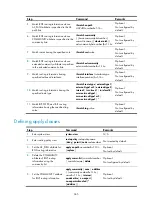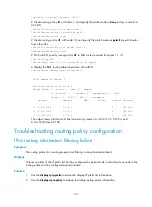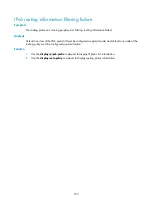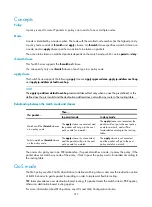
363
Defining an extended community list
You can define multiple items for an extended community list that is identified by number. During
matching, the relation between items is logic OR. If routing information matches one of these items, it
passes the extended community list.
To define an extended community list:
Step Command
Remarks
1.
Enter system view.
system-view
N/A
2.
Define an extended
community list.
ip extcommunity-list
ext-comm-list-number
{
deny
|
permit
} {
rt
route-target
}&<1-16>
Not defined by default.
Configuring a routing policy
A routing policy is used to filter routing information and modify attributes of matching routing information.
The match criteria of a routing policy can be configured by referencing the appropriate filters.
A routing policy can comprise multiple nodes, and each routing policy node contains the following:
•
if-match clauses
—Define the match criteria that routing information must satisfy. The matching
objects are some attributes of routing information.
•
apply clauses
—Specify the actions to be taken on routing information that has satisfied the match
criteria, such as route attribute modification.
•
continue clauses
—Specify the next routing policy node to be matched. With this clause configured,
when a route matches the current routing policy node, it continues to match against the specified
next node in the same routing policy.
Configuration prerequisites
Before configuring this task, you need to configure the filters and routing protocols. You also need to
decide on the name of the routing policy and node numbers, match criteria, and attributes to be
modified.
Creating a routing policy
Follow these guidelines when you create a routing policy:
•
If a routing policy node has the
permit
keyword specified, routing information matching all the
if-match
clauses of the node will be handled using the
apply
clauses of this node, without needing
to match against the next node. If routing information does not match the node, it goes to the next
node for a match.
•
If a routing policy node has the
deny
keyword specified, the
apply
clauses of the node is not
executed. When routing information matches all the
if-match
clauses of the node, it cannot pass the
node, or go to the next node. If route information cannot match all the
if-match
clauses of the node,
it goes to the next node for a match.
•
When a routing policy has more than one node, at least one node must be configured with the
permit
keyword. If the routing policy is used to filter routing information, routing information that
does not meet any node cannot pass the routing policy. If all nodes of the routing policy are set with
the
deny
keyword, no routing information can pass it.






























